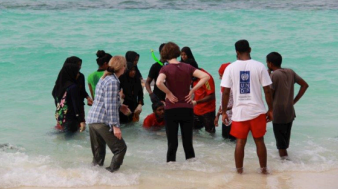Increasing Climate Change Resilience of Maldives through Adaptation in the Tourism Sector
Turquoise waters, sandy beaches, coral reefs teeming with vibrant fish – there is little wonder why small island destinations are some of the world’s top tourist hotspots. Yet small islands have become particularly vulnerable to the damaging impacts of climate change. The natural risks affect the islands’ tourism sector - a main source of livelihood for many local communities.
Responding to these challenges, the United Nations Development Programme (UNDP) has been supporting governments, tourism businesses and local communities in the Maldives, among other small islands ̶ counted among the world’s most emblematic island destinations ̶ to help them adapt and enhance their resilience in response to climate change.
Stimulating joint actions by tourism operators and associated island communities in climate resilient water, waste, energy and infrastructure management The Tourism Adaptation Project, financed through the Global Environment Facility – Least Developed Countries’ Fund (GEF-LDCF), has given small grants to repair eroded beaches, replant mangroves, raise awareness of their protective properties, improve waste management, and establish breeding platforms for a variety local bird populations. All these activities have been jointly implemented by resorts and local communities sharing the same atoll lagoons, helping them understand how adaptation to climate change positively impacts their businesses and livelihoods. In line with this project, the Maldives Tourism Adaptation Platform (MTAP) was set up by the Maldives Ministry of Tourism to manage the grant schemes along with the membership of non-government partners, including the association of tourism industries, island councils and civil society organizations. The platform has not only allocated grants but also spearheaded stronger policy coordination. As a result of pilot activities, the project is developing a comprehensive policy guide to recommend practical solutions as a response to the challenges caused by climate change.


